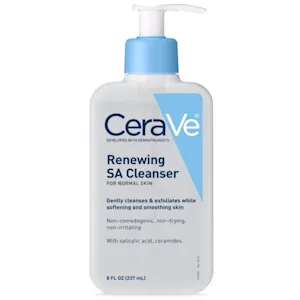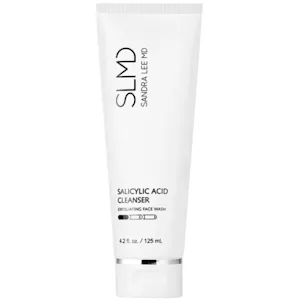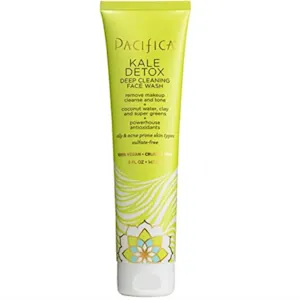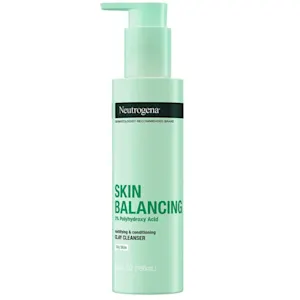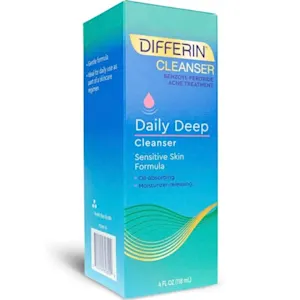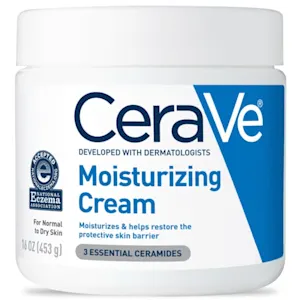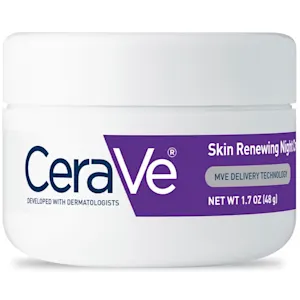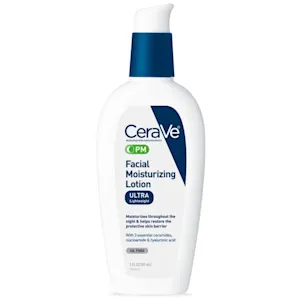Perfect Your Oily-Skin Makeup Base
When it comes to applying makeup, having the correct base isn’t just the starting point of any makeup routine, it is fundamental to achieving the best results possible. Generally, makeup primers ensure that the natural texture of the skin will be smoothed out, in order for the makeup to lay more evenly on the skin. It also creates a barrier between the pores of the skin that release sebaceous oil and the makeup. This is important because oil breaks down makeup, making the barrier provided by primers essential for makeup wearers with oily skin to have a seamless, long-lasting finish.
Prepping the Skin
Cleansing
The first step in any makeup routine should be to properly cleanse the skin. This will ensure that all of the products you apply post-cleanse will perform and look their best without any interference from dirt, bacteria, or oil that can be found on the skin.
Find the best cleansers for oily skin:
Top recommended salicylic acid cleansers:
![La Roche-Posay Effaclar Medicated Gel Salicylic Acid Face Cleanser for Acne Prone Skin]()
La Roche-Posay Effaclar Medicated Gel Salicylic Acid Face Cleanser for Acne Prone Skin
- 6.76 fl oz
$14.99 on Amazon ![CeraVe Renewing Face Cleanser with Salicylic Acid]()
CeraVe Renewing Face Cleanser with Salicylic Acid
- 9 fl oz
$17.54 on Amazon ![SLMD Salicylic Acid Cleanser]()
SLMD Salicylic Acid Cleanser
- 4.2 fl oz
$24.99 on Target
Top recommended oil-absorbing cleansers:
![Pacifica Kale Detox Deep Cleaning Face Wash]()
Pacifica Kale Detox Deep Cleaning Face Wash
$9.99 on Amazon ![Neutrogena Skin Balancing Mattifying Clay Cleanser]()
Neutrogena Skin Balancing Mattifying Clay Cleanser
- 6.3 fl oz
$7.99 on Amazon
Top recommended benzoyl peroxide cleansers:
![CeraVe Acne Foaming Cream Cleanser with 4% Benzoyl Peroxide]()
CeraVe Acne Foaming Cream Cleanser with 4% Benzoyl Peroxide
- 5 fl oz
$14.95 on Amazon ![Differin Daily Deep Cleanser with 5% Benzoyl Peroxide]()
Differin Daily Deep Cleanser with 5% Benzoyl Peroxide
- 4 fl oz
$10.44 on Amazon
Moisturizing
When people with oily skin are trying to decide on which moisturizer to use, there are two important factors to consider: is your skin oily or oily and dehydrated? Oily skin can also be skin that is actually dehydrated and produces more sebum than it normally would in order to compensate for the moisture that is lacking in the deeper layers of the skin. People who suffer from acne are likely to suffer from dehydrated skin as well. This is why choosing the right products for your particular oily-skin type is essential in order to properly moisturize but also avoid overly stripping the skin and disrupting the skin’s natural moisture barrier.
Those with dehydrated oily skin should search for products that are gentle on the skin. When applying makeup, water-based, gel-like, light moisturizers are best. If you apply a thicker moisturizer, do so cautiously, as the natural oils of the skin and heavy moisturizer combined can cause the skin to become even more shiny in appearance. They will also build up under makeup, leading to a cakey look and a heavy feel on the skin.
Find the best Moisturizing for oily skin:
![CeraVe Moisturizing Cream]()
CeraVe Moisturizing Cream
- Walmart: 16 fl oz
- Amazon: 19 fl oz
$13.54 on Walmart $16.08 on Amazon ![CeraVe Skin Renewing Night Cream]()
Skin Renewing Night Cream
- 1.7 fl. oz.
$13.98 on Walmart $13.98 on Amazon ![CeraVe PM Facial Moisturizing Lotion]()
PM Facial Moisturizing Lotion
- 3 fl. oz.
$12.38 on Walmart
Sunscreen
The American Academy of Dermatology recommends that people with oily skin incorporate the usage of non-comedogenic sunscreens in order to keep the skin protected from the sun’s harmful rays. While most people know they should be applying sunscreen, not many know at what point during their makeup routine should sunscreen be applied.
Sunscreen should be applied after all skincare products have already been applied, but before any makeup products, including makeup primers. It is also important to apply the correct amount—about a teaspoon—to every part of the face and neck, including the ears.
Find the best sunscreens for oily skin:
![EltaMD UV Clear Broad-Spectrum SPF 46]()
EltaMD UV Clear Broad-Spectrum SPF 46
- 1.7 oz
$37 on Amazon ![Australian Gold Botanical SPF 50 Tinted Face Sunscreen Lotion]()
Australian Gold Botanical SPF 50 Tinted Face Sunscreen Lotion
- 3 oz
$13.49 on Amazon ![Black Girl Sunscreen SPF 30]()
Black Girl Sunscreen SPF 30
- 3 oz
$18.99 on Black GirlCheck Price on Amazon ![Peter Thomas Roth Instant Mineral SPF 45]()
Peter Thomas Roth Instant Mineral SPF 45
- 3.4g
$30 on Amazon ![CeraVe Ultra-Light Moisturizing Face Lotion with Sunscreen]()
Ultra-Light Moisturizing Face Lotion with Sunscreen (SPF 30)
- 1.7 fl. oz
$14.96 on Walmart
Primer
Primers are an oily-skin person’s best friend. They don’t just create a safety barrier between your oil-secreting pores and your makeup, but they also fill in all of the fine lines, large pores, and other textures, leaving a smooth canvas for your makeup to be applied over.
There are two types of primers—water-based primers and silicone-based primers. The primer you should use depends on your foundation of choice. Also, a pea-sized amount of either primer type should be sufficient to cover the entire face.
Silicone primers
Silicone primers are smoothing, allowing your makeup to glide over your skin without sinking into pores, creases, and fine lines. Silicones form a protective barrier over your skin, trapping whatever happens to be underneath, including moisture. This can be beneficial for those with dry or dehydrated skin but problematic for people who suffer with acne, as many people with oily skin do, because dirt, bacteria, and oil will also be locked in underneath the primer. If you do decide to choose a silicone primer, be sure to use a very minimal amount.
It’s relatively easy to find out if you have a silicone-based primer, as one of the first five ingredients will end in “-cone” or “-siloxane.” Similarly, your foundation should also contain similar ingredients. If you choose to use a silicone-based primer, your foundation should also contain silicone.
Looking for a silicone-based makeup primer? Try the Benefit Cosmetics POREfessional Pore Primer
Water-based primers
Water-based primers, on the other hand, will typically have “water” as the first ingredient, as will the foundation that should be paired with this type of primer. Water-based primers are super lightweight and also help to moisturize the skin. They also tend to leave a dewy finish. While they may not be as skin-smoothing as a silicone primer, they’re more lightweight, feel lighter on the skin, and have a more natural-looking finish, making them great for everyday wear.
Looking for a water-based makeup primer? Try the Milk Makeup Hydro Grip Primer
Trying out both silicone-based and water-based primers is the best way to find the primer that works best for you, your oily skin, and your makeup.

